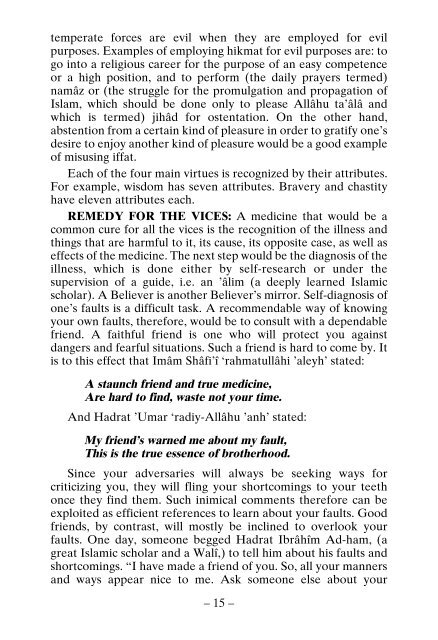Ethics of Islam
Ethics of Islam is taken from the book Berîka by Muhammad Hâdimi. Immorality and ways to get rid of it; 40 depravities and cures to them; usefulness of ethics; what is a soul; strengths of a soul; Personalities emanating from wisdom, courage, chastity and justice are extensively explained.
Ethics of Islam is taken from the book Berîka by Muhammad Hâdimi. Immorality and ways to get rid of it; 40 depravities and cures to them; usefulness of ethics; what is a soul; strengths of a soul; Personalities emanating from wisdom, courage, chastity and justice are extensively explained.
You also want an ePaper? Increase the reach of your titles
YUMPU automatically turns print PDFs into web optimized ePapers that Google loves.
temperate forces are evil when they are employed for evil<br />
purposes. Examples <strong>of</strong> employing hikmat for evil purposes are: to<br />
go into a religious career for the purpose <strong>of</strong> an easy competence<br />
or a high position, and to perform (the daily prayers termed)<br />
namâz or (the struggle for the promulgation and propagation <strong>of</strong><br />
<strong>Islam</strong>, which should be done only to please Allâhu ta’âlâ and<br />
which is termed) jihâd for ostentation. On the other hand,<br />
abstention from a certain kind <strong>of</strong> pleasure in order to gratify one’s<br />
desire to enjoy another kind <strong>of</strong> pleasure would be a good example<br />
<strong>of</strong> misusing iffat.<br />
Each <strong>of</strong> the four main virtues is recognized by their attributes.<br />
For example, wisdom has seven attributes. Bravery and chastity<br />
have eleven attributes each.<br />
REMEDY FOR THE VICES: A medicine that would be a<br />
common cure for all the vices is the recognition <strong>of</strong> the illness and<br />
things that are harmful to it, its cause, its opposite case, as well as<br />
effects <strong>of</strong> the medicine. The next step would be the diagnosis <strong>of</strong> the<br />
illness, which is done either by self-research or under the<br />
supervision <strong>of</strong> a guide, i.e. an ’âlim (a deeply learned <strong>Islam</strong>ic<br />
scholar). A Believer is another Believer’s mirror. Self-diagnosis <strong>of</strong><br />
one’s faults is a difficult task. A recommendable way <strong>of</strong> knowing<br />
your own faults, therefore, would be to consult with a dependable<br />
friend. A faithful friend is one who will protect you against<br />
dangers and fearful situations. Such a friend is hard to come by. It<br />
is to this effect that Imâm Shâfi’î ‘rahmatullâhi ’aleyh’ stated:<br />
A staunch friend and true medicine,<br />
Are hard to find, waste not your time.<br />
And Hadrat ’Umar ‘radiy-Allâhu ’anh’ stated:<br />
My friend’s warned me about my fault,<br />
This is the true essence <strong>of</strong> brotherhood.<br />
Since your adversaries will always be seeking ways for<br />
criticizing you, they will fling your shortcomings to your teeth<br />
once they find them. Such inimical comments therefore can be<br />
exploited as efficient references to learn about your faults. Good<br />
friends, by contrast, will mostly be inclined to overlook your<br />
faults. One day, someone begged Hadrat Ibrâhîm Ad-ham, (a<br />
great <strong>Islam</strong>ic scholar and a Walî,) to tell him about his faults and<br />
shortcomings. “I have made a friend <strong>of</strong> you. So, all your manners<br />
and ways appear nice to me. Ask someone else about your<br />
– 15 –

















